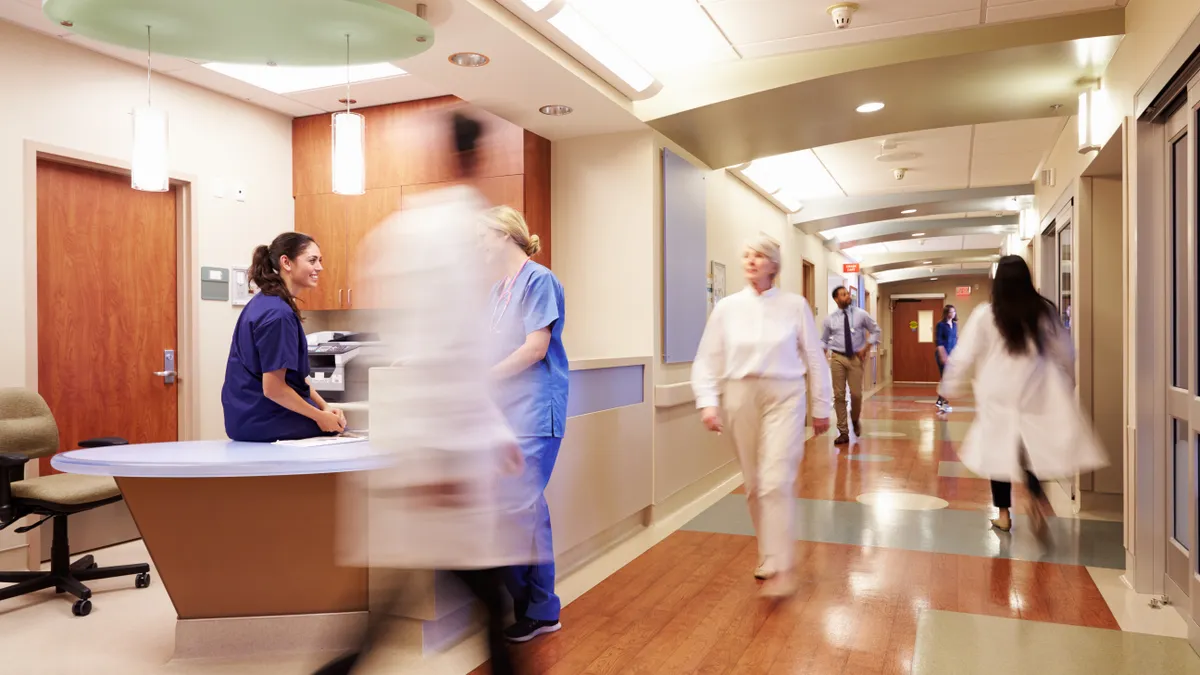Dive Brief:
- The Biden administration is investing $1.5 billion through the American Rescue Plan to address workforce shortages and health disparities with scholarship and loan repayment programs for healthcare students committing to work in hard-hit and high-risk communities, according to a Tuesday release from the White House.
- The awards will support the National Health Service Corps, Nurse Corps and Substance Use Disorder Treatment and Recovery programs, the White House said.
- Some $330 million in ARP funding will also be allocated to support primary care and dental workforces in underserved communities through the Teaching Health Center Graduate Medical Education program.
Dive Insight:
The COVID-19 pandemic's toll on the U.S. healthcare workforce is still unfolding. Widespread burnout among those on the front lines is spurring many to rethink their careers, with some opting for early retirement, leaving the field entirely or taking higher-paying traveling jobs.
Staffing shortages have impacted the entire healthcare industry, from hospitals to medical device companies. Medtechs like Medtronic and Johnson & Johnson reported that staffing shortages have contributed to procedure volume and patient visit declines in their latest quarters, putting additional pressure on their businesses.
The issue may not be solved anytime soon. Ashley McEvoy, J&J's worldwide chair for medical devices, said during an October earnings call that labor shortages are not expected "to get better in quarter four nor in 2022."
Health systems are grappling with the squeeze by offering hefty sign-on bonuses and revamping benefits, though they're still struggling to recruit and retain needed staff.
But staffing shortages have long been a concern for the industry and lawmakers, along with issues around a lack of diversity within the profession. The new funding will attempt to tackle those issues in communities hard-hit by COVID-19.
A shortage of almost 60,000 primary care doctors, dentists and psychiatrists is expected over the next decade, according to the release. And an estimated 158,000 new nurses will need to graduate every year for the next 10 years to meet projected demand.
At the same time, student debt associated with a graduate health education can average more than $200,000 "and prevent students from underserved communities from even considering a career in health care professions," the release said.
The funding will support over 22,700 doctors, dentists, nurses and behavioral health providers who commit to work in underserved communities through the National Health Service Corps, Nurse Corps and Substance Use Disorder Treatment and Recovery programs.
The pandemic spurred a rise in mental health and substance abuse issues that are also still unraveling.
Substance use and drug overdoses in the country have increased since the pandemic was declared a national emergency in March 2020, according to research from the National Institutes of Health.
About 7% of physicians in the U.S. identify as Black or Latino compared to over 25% of physicians serving in the National Health Service Corps, according to the White House.
The Teaching Health Center Graduate Medical Education program uses community-based primary care residencies in family medicine, internal medicine, pediatrics, psychiatry, obstetrics and gynecology, dentistry and geriatrics to support expanding those workforces in underserved communities.
The funding comes in response to recommendations from the Presidential COVID-19 Health Equity Task Force, which submitted its final report to the White House COVID-19 response coordinator earlier this month.













